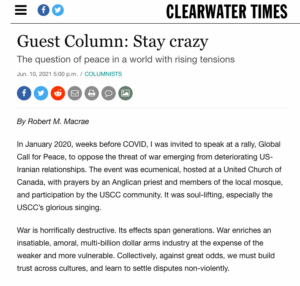June 17, 2021
 In a guest column in the Clearwater Times titled "Stay crazy: The question of peace in a world with rising tensions", columnist Robert M. Macrae gives prominence to Dr.Riane Eisler's work on Partnership Systems and societies.
In a guest column in the Clearwater Times titled "Stay crazy: The question of peace in a world with rising tensions", columnist Robert M. Macrae gives prominence to Dr.Riane Eisler's work on Partnership Systems and societies.
Macrae found himself asking the same question that Eisler once asked herself: "Why, when we humans have such a great capacity for caring, consciousness, and creativity, has our world seen so much cruelty, insensitivity and destructiveness?"
Macrae was introduced to Eisler's work by an attendee of his speech at Global Call for Peace, a rally to oppose the threat of war emerging from deteriorating US-Iranian relationships.
"I asked if I was crazy, naïve or hopelessly idealistic to believe war is avoidable and unnecessary. I wondered why humanity had not chosen the far-lower cost, infinitely more humane option, of peace?
Afterwards, we gathered for conversation. An attendee suggested I read The Chalice and the Blade (1987) by Riane Eisler. “Stay crazy,” he told me with an elfin chuckle, “and keep asking why seeking peace seems crazy, naïve or hopelessly idealistic.”
It seems Macrae found the answer to his question through Eisler's work. He highlights her research on Neolithic societies:
"Neolithic people lack written histories, but we can learn from the stories embedded in their art.
Eisler considers art to be a symbolic expression of how people experience and shape reality. When we let Neolithic art speak, without projecting our biases onto it, a fascinating and hopeful story unfolds."
He highlights the egalitarian and matrilineal characteristics of Neolithic societies:
"Eisler emphasizes that women did not dominate Neolithic societies, rather women and men worked together in equal partnership for the common good. The Neolithic message is not to conquer, pillage and loot, but to cultivate the earth and provide the material and spiritual wherewithal for life with dignity."
Macrae concludes his piece with a statement that Eisler has dedicated her whole life's work to:
"Eisler argues that until western societies abandon hierarchical, unequal, male-dominated societies founded on acquisition and consumption far beyond our needs, in exchange for equality and sharing the earth’s resources sustainably and equitably, war and its crushing toll will continue without end. War, concludes Eisler, is not the rule. It reflects a recent arrest and reversal in social development."
Read the entire article here.
See also: Riane Eisler on the Economic Value of Caring



Leave a Reply